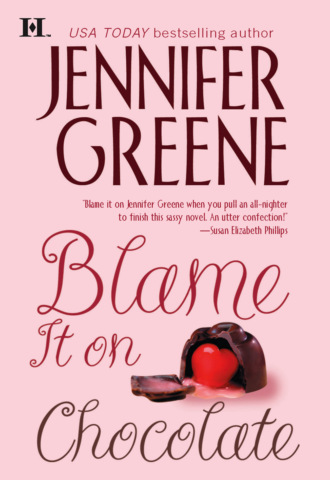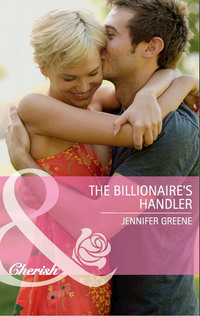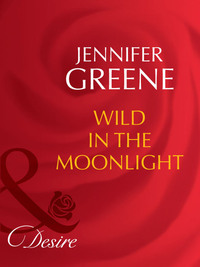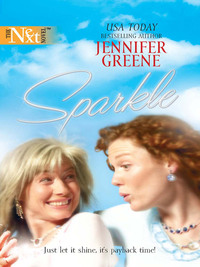
Полная версия
Blame It on Chocolate
She swallowed quick before turning to greet Nick. Then wanted to swallow a second time.
Nick had suit days and working-clothes days. Today he was in serious navy-blue, and he wore a suit the way a young Cary Grant used to, all careless grace and elegance. Usually she could handle him in a suit, because there was so much natural distance between her dirt-under-the-fingernails and his classiness that they might as well speak different languages. When he was wearing a black T-shirt and jeans, though, she had to admit he made her heart thump.
This morning, the sharp white shirt and formal navy-blue didn’t seem to do the distance-job. Her throat still went dry. Her pulse soared like a leaf in a high wind. He had his grandfather’s long rectangular face, the strong jaw, the strong cheekbones, the startling blue eyes. His hair was a thick dark brown, and no matter how ruthlessly he brushed it, it never lay quite straight. It wasn’t curly or wild exactly, more like it had an irrepressible rebellious streak. Just like him.
Near anyone else, she didn’t worry about her appearance—between messing with dirt and chocolate, she just didn’t have a job requiring haute couture. Around him, though, she felt hopelessly conscious of her kid-like jeans and flat figure. She could put forty-seven style products on her hair and it’d still be fine and flyaway. She always chewed off her lipstick. If she could afford to shop on Rodeo Drive, Lucy had the sneaky suspicious she’d still end up looking like an all-American kid sister. Glamour just wasn’t her. And that was okay. With everyone else.
“Nick,” she said warmly, “How’s your Monday going?”
She’d fantasized about him all her life. Maybe technically she hadn’t met him until she hired on at Bernard Chocolates, but that was neither here nor there. He made her feel hot and achy the way she always dreamed a guy would make her feel. Every cell in her body, every pore, came alive when he was in the same room. His smile gave meaning to the word yearning. His eyes gave in-depth potential to the whole concept of lust.
It was so tiresome.
“So far, the Monday’s been a little wild. How’s yours going, Luce?” He handed her a mug, peach tea, a scoop of sugar, without having to ask. It wasn’t the first meeting they’d had together.
It wasn’t the first time he’d been quietly considerate with her, either.
Unfortunately, his being nice never stopped her heart from thundering, her eyes from looking, her pulse from hiccupping every time she was around him. She took her mug and settled on a chair next to Orson, hoping that she’d get a grip before she had to kick herself.
In the beginning, she’d found her reaction to him kind of kicky. She hadn’t had a crush in years; it was kind of fun—and God knew, he was a sexy hunk, so why not enjoy it? But time passed. She was serious about her work, and both wanted and needed to be taken seriously—which he did. The crush thing just stopped being cute. It shamed her to respond in such an immature way to a guy who’d always been good to her—in a big-brother, thoughtful-employer kind of way. Nick Bernard may only be in his early thirties, but they might as well have been a century apart in experience and lifestyles.
When she and Orson settled in the thick, soft upholstered chairs, Nick pulled over an ottoman and hunkered down, then motioned for his grandfather to start the dialogue.
“Lucy…you know we’ve got our miracle. The quality of those experimental plants is beyond anything we’ve ever dreamed. But now it’s time to do something about it.”
“Yes, sir.” This was exactly the subject she was expecting and she couldn’t agree more.
“It’s not time to stake the company on it, or to put all our bets in one basket yet.”
“Of course not, sir.”
“But it is time to make a move. If this develops the way we hope, we’ll be buying land and creating an extensive cacao forest in several locations. But for now, we have ample space to put up five or six more greenhouses—enough expansion to play with some products and real production. Obviously we’ll want to stagger the plantings, so we’ll have varied ages and varied crops coming into production at different times.”
“Of course, sir.”
“I’m unwilling to take this off-property where there’s such a huge security issue. As I know you understand, word of what we’re doing could have an explosive effect on the Coffee and Sugar Exchange. We’re talking an immediate effect of millions, if not billions. But that’s potential. All we know right now is that we’ve got a taste of something that looks like gold. It hasn’t been completely tested.”
She put down her tea. Somehow she couldn’t finish a hot drink to save her life this morning, but for darn sure, she was too excited to drink it now. “I know, I know. And I just totally agree with everything you’re saying.”
“Well, good. Because this is really your brainchild, Lucy.”
“Oh, no. Not really. I mean, I think of it as my baby—but you both know I only hired on after the whole experiment had been started. It wasn’t originally my experiment—”
“Yes, but you’re the one who took it on. Who brought it to fruition.”
“Only because Ludwig was such an incredible teacher.” She hadn’t forgotten the old man—Orson’s horticulturalist—who’d brought her into the fold, made mincemeat of her botany degree, and then taken the time to give her the intensive, practical education that mattered.
“This is no time to be modest, Lucy. I know what Ludwig did. But I also know what you accomplished on your own in the last few years. More important yet, we know that we can completely trust you, right, Nick?”
Lucy glanced at Nick, only to feel uneasiness stir. Whatever was on Orson’s mind, Nick clearly didn’t agree with his grandfather. His handsome face went still, his expression cool. “Yes. We trust you, Lucy.”
He didn’t say but, but she mentally heard it. Orson continued on.
“When we take all this public—several years down the road—I don’t know what kind of management setup we’ll need. Or what part you’ll want to play in it. But right now, we want to expand and yet stay private. Put serious money into more extensive experiments and yet not take untoward financial risks.” Orson leaned back and crossed his leg over a knee the same way his grandson did. “Lucy, I wonder how much you feel you could handle.”
“Me?”
“I’d like you to manage the project. Handle the labor to get the additional greenhouses up and running. Plan the planting program. All of it.”
“Me?” she echoed.
“I don’t know why you’re sounding surprised. The staff already thinks you’re a terrific boss.”
“But I’m not exactly a boss,” she objected. “I never thought of myself that way. Once Ludwig left…well, we all function as a team. Reiko’s older than I am. And Fritz and Fred…well, they’re more like puppies than employees. I mean, I’ve never actually given anyone orders to do anything—”
Orson smiled affectionately. “Actually, you do, Lucy—but in a way that everyone appreciates. And I have total faith you can handle the promotion. In fact, there is absolutely no one else I want to do it.”
When he mentioned the salary that went with the promotion, she almost fell off the chair. She wanted to. Actually, she wanted to leap on the couch whooping and screaming, but of course she didn’t.
“Mr. Bernard, I’d love a chance at this. I can’t tell you how hard I’ll work and try to deserve your trust in me.” She tried to sound her subdued best, but her head was still yelling ohmygodohmygodohmygod. New car, here we come! Hell’s bells, she might even move up to an Accord.
Here she’d been so sure this day was doomed for a nosedive because of that ugly bout of stomach trouble. Had she ever been wrong. And really, she should have known. She’d worked hard and long to make a life plan come together. Her life wasn’t going so perfectly by accident, but because she’d fought so hard. Darn it, she deserved it.
But just then, she glanced at Nick again.
CHAPTER TWO
NICK STARED out the sunroom window, jingling the change in his pocket, watching Lucy charge across the lawn back to the greenhouse. The dogs had found her—no surprise. The only shock was that they hadn’t found her before this.
Baby was a full-blooded Great Dane, where Boo Boo—well, Boo Boo’s name was self-explanatory. Baby had been bred with a ribbon-winning sire and dutifully stood for him, but the minute she’d been brought home, she took off and found her own choice of lovers. Boo Boo was the result. The dog’s coloring and size were pure Great Dane, but the ears drooped and the tail was wrong and his expression was downright dopey.
Either way, both dogs were bigger than Lucy. The faster she ran, the more they appeared to be chasing her, but that wasn’t really true. They simply bounded and leaped around her, thrilled to have their favorite female visit. They adored her. When Boo Boo latched on to her wrist, he never left a mark. When they lavished kisses on her face—and she screamed—they just wagged their tails, understanding that she wasn’t remotely annoyed.
Nick wanted to shake his head.
Lucy—whose creative horticultural talents could potentially bring in a multiple seven-figure windfall for Bernard Chocolates—had a red nose, a dog-licked chin, a silly flower hat that had fallen in the snow, and jeans with a hole in the knee.
“She’s too young,” Nick said to his grandfather.
Orson stepped behind him, carrying a fresh mug of coffee. “I know she looks young. But she’s just under thirty. You were running the manufacturing operations at that age.”
“But that was only because I had to. Because Mom and Dad died. Because you were ill. And because Clint couldn’t tell a balance sheet from a bowling ball.”
“Your brother is just as smart as you are. He could have taken the ball if he’d just had the interest, the ambition. Once he got that young woman pregnant, everything went downhill for him. The point being, when your parents died, you were both too young to run a company. Technically. But you grabbed hold of the challenge and made it happen.”
Nick had heard the refrain of this story too many times before. It was Orson’s gospel. Gramps would have forgiven his grandsons all kinds of goofs—car wrecks, losing a few million, run-ins with alcohol or drugs, probably even a bank robbery—but he was ancient-old-school as far as women. A man didn’t get a woman pregnant and leave her. Period. Unfortunately, Clint had made exactly that mistake. Orson had never forgiven him, no matter what Clint had said or done since.
Every once in a while, Nick tried playing go-between. It always worked the same way. Trying to intercede always resulted in his head getting kicked from both directions. But right now, his older brother’s problems weren’t on the table. The situation with Lucy was.
“Lucy isn’t me. It’s not the same thing.”
“No, it isn’t, but we’re not asking her to run an international manufacturing operation, either.”
Nick heard the stubborn note in his grandfather’s tone and knew the old man was spoiling for a fight. Orson loved to fight and most of the time Nick gave in. The Bernard Experimental Station was one of Orson’s wild-haired follies, which in itself didn’t bother him. Orson, after all, had turned Bernard Chocolates into the multimillion-dollar operation it was. If he wanted to fritter away some money, God knew, he was entitled. This situation, though, was different.
“Lucy knows that new breed of cacao is potentially worth a fortune. She’s not used to pressure. She’s not trained for it. It’s not a fair thing to put on her shoulders.”
When Orson didn’t immediately argue, Nick focused again on the view below.
She was almost out of sight now, but not completely. A copse of tall blue spruce formed a privacy barrier between the house and experimental station. She had almost reached the woods.
Her hair looked more silver than blond, especially in sunlight, and was finer than filament. She wore it chin-length and simple, but it whished around her face every time she moved.
He knew she wasn’t as young as she looked—it had to be challenging to look mature for someone who barely reached five-three and had that baby-fine hair. He’d never seen her wear makeup. Maybe she troweled on five pounds of face paint when she went out, but he only saw her at work. Makeup made no sense in the damp, warm environment of the greenhouses. Her skin was so damned gorgeous, he thought she’d be silly to goop it up anyway.
The eyes, though. God. A guy could look into those hazel eyes, get lost and never find his way out. They were dark gold and mesmerizing, framed with a thick fringe of short lashes. Sometimes, talking to her, he could look and look and look in those eyes. Forget who he was, forget how different they were, forget how young she was.
“She doesn’t have the background to take on this kind of responsibility,” Nick said firmly.
“Oh? What kind of background is that?” Orson’s tone was wry. “She took Ludwig’s experiments and turned them completely around. On her own. Alone. She’s creative, bright, intuitive. She works harder than any three men. She’s responsible to the nth degree.”
“I know all that,” Nick said testily.
But Orson wasn’t through singing her praises. “Everybody loves her. She may not think of herself as a leader, but everyone else does. She’s always at the head of the pack, making the work fun for everyone else, bringing fresh ideas and spirit and excitement to every project she’s involved with.”
“Gramps, I know all that. And I like her, too. It’s just…” Nick wasn’t used to fumbling, but it was hard to find the right word to phrase his objections. Saying everyone liked Lucy was like saying the sky was blue. Of course they liked her. She was like a fresh breeze on a dark day, always upbeat, always finding the right thing to say. And she listened. She tilted her head just so, listening to whoever was speaking intently. She heard people. She didn’t just talk. She really heard people.
Like him.
One time—God knew how she’d gotten him talking—Lucy had definitely heard him.
Orson was still musing on the nature of the project. “Obviously there are areas we’d have to take on ourselves. I don’t know how many extra employees we’ll need to hire. And security is a critical concern—but you can take that on, can’t you, Nick? She’d be in charge of the growing, the plantings, the direct work. But you could oversee that, as well.”
“You don’t think I have enough to do?”
His grandfather regarded him patiently. “I think you’ll find time for this because you’re as excited about the idea as I am.”
“Maybe.”
“You thought it was an old man’s foolishness. That I was throwing away money on these experiments. That there wasn’t a chance any of them could possibly work.”
“Don’t rub it in.”
“But you were as thrilled as I was when the results came through. That chocolate was better quality than any we’ve ever produced. Better than any we’ve ever tasted from any company. Anywhere on the globe.”
“All right. All right. So I’m as excited as hell,” Nick said irritably.
Orson smiled, but then he turned serious. “It’s not just that I feel Lucy has earned the promotion and opportunity. I do think that. But also there are few people in this life that I completely trust. That girl has integrity. She wouldn’t pick up a dime on the street that wasn’t hers.”
“That’s partly why I think she’s too young. She’s naive. That kind of young. Still idealistic. All that shit.”
“So am I,” Orson said mildly.
Nick shot him a grin. “Yeah, but you’re hopeless. Besides, you’re my grandfather, so I can find a way to protect you whether you want me to or not.”
Orson smiled back, but then he simply looked thoughtfully at his grandson. “Do you have some personal reason you’re not comfortable with Lucy?”
“Of course not.” Nick easily and immediately put that question to bed, but he thought damn right he had a reason.
She was attracted to him. It was an embarrassment for her—a problem that cropped up the minute he showed up, that other people noticed, that made it hard for her to work with him. He didn’t want her hurt, and didn’t want to put her in any situation where he knew she could be hurt.
But explaining that to his grandfather would only make it more awkward for Lucy—and himself. The answer was simply to stay as far away from her as possible.
“Look, Gramps, put her in charge, if you want. Give her the promotion. But we’ve got a dozen irons in the fire over the next few months. I’ve got to be in Europe part of that time. So let me think on it, see if I can find someone else who can watch over her and the project.”
“Someone besides you.”
“Exactly.”
“We both know this is something that could revolutionize the chocolate industry. We just can’t put it in the hands of a stranger,” Orson said.
“I know. I agree.” It was a worry in itself that Lucy had been the one to come through with the miracle. If Nick had ever believed it could happen, he’d have hired massive, unprecedented security for the project from the get-go. But that was like fretting over spilled milk. “I’ll find the right person.”
“As long as it isn’t you,” Orson repeated again.
“It won’t be me,” Nick expressed with absolute certainty, then glanced at his watch. “I’ve got to get rolling. Madris going to drive you to the doctor’s this afternoon?”
“Between you and Madris, someone’s hounding me nonstop. I’m sick of it.”
Nick turned away from the window completely, ready to concentrate completely on Orson now.
She was out of sight.
FOR A MONDAY that started out darn worrisome, it sure turned out fabulous. The instant Lucy got home, she dropped her jacket…on the floor. Peeled off her boots. Then, as an afterthought, chucked the rest of her clothes down to her underpants.
Yes. With the word promotion singing through her head like an aria, she danced through the house, flipping on the tube to the Oxygen channel, then boogie-wooing into the kitchen to pour herself a half glass from her dusty bottle of Gallo, then sipped it, still dancing. She started getting chilled from running around without clothes, but who cared?
Promotion. What a bubble-popping, orgasmic, rainbow-pretty word. Dollar signs paraded in her mind. Big, beautiful dollar signs. Now she’d have money to pay for the white carpeting. Money to upgrade the Civic. Money to pay off her Pottery Barn couch and the purple satin sheets and the museum print of the eagle.
She was gonna be…okay, not rich…but solvent, solvent, solvent.
And more to the point, oh, way, way, way more to the point…she was going to be a major player in the chocolate thing. It was actually going to be her baby. Seeing the advent of chocolate not dependent on rain forests. Developing the most fabulous chocolate products in the known universe. Creating products that no one else had—that no one else had even dreamed of.
Her.
Lucy.
Lucy Fitzhenry.
Was actually going to make history. Chocolate history. So it wasn’t world peace or a cure for cancer, but sheesh. When push came to shove, what was one of the most absolutely critical things in life?
A rhetorical question, of course, as she sashayed over to her private stash by the computer drawer. One truffle before dinner. Oh, yes, all the rules were going by the wayside tonight. If those who called her an obsessive-compulsive fuddy-duddy could only see her now…having chocolate before dinner. With wine. Walking around the house near naked. No looking at the bills. No cleaning. No doing anything constructive.
And they said she’d never manage being wicked. Hah. She was just swallowing the last sip of wine when the doorbell rang.
She froze, then spun around, cracked her toe on a chair leg, winced, and then hobbled into the bedroom, yelling, “Hold on! I’ll be there in a minute!” As fast as she could, she yanked on yoga pants and a sweatshirt, yelling out another promise at the top of her lungs, and then pedaled for the front door.
Because she was wicked—not crazy—she naturally looked through the peephole first. Her jaw dropped even as she hurled the door open. “Dad! What on earth are you…?”
She started to ask what her father was doing here, but since he was standing there with a suitcase, some kind of crisis was self-explanatory. The suitcase itself showed more proof of a crisis. It was one of those old-fashioned cases—hard-shelled like a turtle, gray, the kind that was too heavy to carry but you just couldn’t kill it off; throw it off a cliff and it’d land without a dent. Only this one had three socks clamped in its teeth. One white, two black.
“Dad?” she asked more gently, by that time pulling him into the light by the front door.
“Your mother kicked me out. She told me to get out and stay out.”
There. Her worst nightmare. The reason she’d stayed home so long and never moved away like every other self-respecting, independent adult woman. Only damn. She’d always feared her parents would argue each other to death if she wasn’t there to play referee.
“Come on, give me your coat.” He was just standing there with the suitcase, looking at her like a lost soul. Luther Fitzhenry was a surgeon. Cardiac. One of the most brilliant at Mayo—which was saying something. She’d inherited her slight height and skinniness from him. He couldn’t be over five-six and was built leaner than wire. But his heart was huge, and showed clearly in his gentle facial lines and soft blue eyes.
At the moment, he looked a lot more like a confused, lost puppy than a brilliant surgeon. “She says I’m never home. That I’m always at the hospital. That we’re already strangers so I might as well just leave.”
“Okay, okay. We’ll talk about this in a minute, but first let’s calm down.”
“I don’t have anywhere to go, Lucy. If I could just stay here. For a night or two.”
“For a night or two,” she echoed, trying not to feel panicked at the terrorizing thought that he’d stay longer.
“I won’t be a problem.”
“I know you won’t.”
“I just didn’t know where else to go.”
“Uh-huh.” She led him into the living room. He plunked ked down on her green microfiber sofa—the unpaid-for sofa from Pottery Barn—and looked around bewilderedly.
“I love your mother, Lucy.”
“Would you like a drink?”
“You know I don’t drink.” He leaned forward with his long hands hanging over his knees. “On second thought, I would. Chivas on the rocks.”
“Um, Dad. I can’t afford Chivas. It has to be wine or beer.”
“Oh.” He looked at her hopefully. “If I gave you some money, could you go buy some Chivas? I don’t want to put you to any trouble. It’s probably too much to ask. Never mind.” His thick, light hair was graying a little, and right now standing up in strange spikes. “I don’t need a drink. Just completely forget I asked.”
“Dad.”
“What?”
“I’ll go out, get you the Chivas. Just relax now.”
“I love your mother, Lucy.”
“Yes, you said that. I know.”
“She says I never notice anything she does. That I was a spoiled young man and now I’ve turned into a spoiled old man. That I’m self-centered. That I never see her. I keep trying to figure out what brought this all on—”
“Her birthday?”
“No. It can’t be that. I bought her that Mikado watch she wanted for her birthday—”
“That was last year, Dad.”
“Well, it wasn’t that. It was something else. I think…she may have reupholstered the couch. Or bought a new chair. Something like that. I walked in and she just seemed to get madder and madder—” He looked at her pitifully. “Whatever you do, don’t go out just for me.”
Okay. She went out, found a liquor store, bought his Scotch, came home. By then he’d fallen asleep—with his shoes up on her couch. She pulled off his shoes, covered him with a down throw, and then jogged back to the spare room.
She had a bed and various odd pieces of furniture in there because her parents had pawned off all the furniture they didn’t want when she moved out. But since she rarely needed a spare bed, she’d tended to fill up the room with stuff. Unfortunately her dad could trip on things like the exercise bike and cross-country skis and snow gear, especially if he woke in the middle of the night, so it all had to be cleared out and cleaned up.









